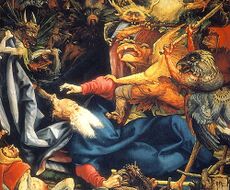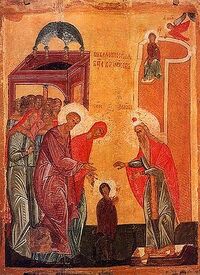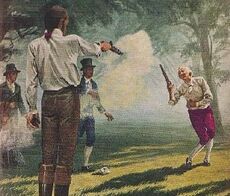Schism

“You take the fork, we'll keep the spoon.”
“We'll take the spoon. You can keep the fork.”
“Heretic! Schismatic!! Splitter!!! Traitor!!!!”
Schism is a Greek word which can be roughly translated as 'shit-slinging between people who were once united but are now bitter enemies.' This definition can include families, political parties, or sporting activities. Some of the bitterest schisms are often between those who once adhered to the same religious credo, but are now praying that their God inflicts unspeakable illnesses and bad lottery luck onto former colleagues.
Those who are in a schism don't see their group as the 'schismatics', but will call their former friends (or at least united behind a common purpose) by that label. A more neutral word would be 'fork', but it is hard to think that the 'other lot' are or were ever true believers in the first place, and will sell out at the next opportunity.
Why schisms happen[edit]
The tendency for humans to split away from each other is inherent in our genes. Evolution favours groups of humans who are at each other's throats, a trait that is now highly developed. You see, a tribe that sticks together and happily does everything the same way, if attacked by predators, may be completely wiped out, its harmonious DNA drained from the planetary gene pool. Whereas, if a schism develops and people go their separate ways, some of the sects may survive even if one dies out. A sect may even suggest to the predators that the sect across the river who worship the golden statues rather than the silver ones would be tastier prey.
This process surely sundered the Neanderthals and Cro-Magnons, likely in a dispute about whose turn it was to light the fire or skin the dinner. It explains how the Indo-European language spread from Ireland to India but is now united only by a few legacy common words like OK, refill, and Mercedes-Benz. Though there is still Indo and Europe, there is no longer an Indo-European. Google Translate will intensify this schism by making far-away peoples even less willing to try to communicate.
However, the history of schism is so poorly documented that archaeologists have filled in the gaps with hours of television shows, offering base speculation, generous reimbursement of expenses, and usually the conclusion that this or that schism owes to 'nefarious influences'.
Religious schisms[edit]

The Christian church is what 'schism' suggests to most people: the Greeks are to blame for this, for their constant eggheading about 'theology', 'politics', 'ethics' — well, pretty much anything. They were a nation of born-brain speculators. Combine this with the advent of an offshoot of Judaism — the Jesus Christ cult — and a belief that there was only one God, and you had plenty of fuel to light fires. As indeed the Christians were apt to do to each other for the next 2,000 years.
Jesus may have been a great teacher, but he was distressingly deficient at paperwork, never leaving any written instructions or a manual about what he was going on about. Nor were his immediate followers any wiser. Was Jesus a super-smart man, a man-god, or a god-man? Or did he just have a very pungent stash of magic mushrooms? The New Testament wasn't any clearer either, so for the next few centuries, Christians bickered and feuded about who was in the right and who was sitting on the devil's knees having his tummy tickled.
This wouldn't have mattered until the Roman Emperor Constantine the Great decided Christianity would work like a big bottle of glue to stick his domains together. Constantine was a few gold bars short of a full load, which became evident at the First Council of Nicaea in 323 AD. An attempt to find a common formula about the nature of Jesus saw one group, the Arians, thrown out. Since Constantine chose to go with the God that mysteriously works in threes (Man, Superman and Kryptonite), the Arians who supported the idea of Jesus as just being a very special bloke were labelled as heretics, schismatic, and losers. It was they who got hunted down with the full force of Roman law, an extension of a state's entertainment policy with gory public executions to satiate the bloodlust.
What the Arians started in the 4th century spread in the 5th century with new theological dividing lines. There were the Nestorians who argued that Mary couldn't have mothered a god since the almighty had 'no mum' but only Jesus's human form. They were condemned and expelled by the later church councils. Then another group went the other way and denied Jesus suffered pain on the cross, that he had no problem reconciling his 'human bits' with his 'divine status', and that he had one spirit. These were called the Monophysites. In fact, neither the Nestorians or the Monophysites called themselves that, in their eyes they were still mainstream Christians ('Catholic and Orthodox') and it was the others who had 'fallen into error'.
Later religious schisms would later be more about authority than theology. The Easterners rejected the Papal stance that in fact Jesus had meant anyone who succeeded St. Peter to have the final say about what was true belief and what was base heresy. This lead to the 'Catholic-Orthodox Schism' of 1054 between the Latino Christians and the Hairy Greek Christians, neither of whom would budge. There would be another schism within just the Catholic church, titled the 'Even Greater Schism' between 1378-1415 but that was about personalities, address locations, papal residences and wafers rather than a theological differences.
In the 16th century, the Protestants moved out of Catholic Unity on a mix of theological and financial reasons: They didn't want to pay for the Vatican's rebuilding work.
Political schisms[edit]
Schisms in politics can be just as deadly as those in religion. Friends once united in a common purpose (like deposing kings and cutting off their noggins) fall out over what to do next.
In 1776, the American Patriots were all united against King George III and his Loyalists: Tories, Red Coats and German Hessians. But after agreeing on what they didn't want, friendships ended over manufactured accusations. So the Patriots split between those who called themselves 'Democratic-Republicans' and the others who adhered to 'Federalism' — which surely meant they were closet Monarchist restorationists. At least, this was Thomas Jefferson's view, but it was his colleague Aaron Burr who tired of endless discussion and decided to sort out his differences with Alexander Hamilton. They had fought against the British, but now each was convinced the other was either an agent of France (Hamilton) or a George III fanboy (Burr). There was only one way to settle it. Hamilton lost and quit politics (and life) for good.
Shooting political colleagues wasn't just restricted to the Americas. In 1809 in Britain, two Tories took exception to each other around the cabinet table. Lord Castlereagh objected to George Canning taking snuff whilst discussing his plans to defeat Napoleon and challenged him to stop. When Canning refused and teased his colleague with his impersonation of Castlereagh's broad Ulster Irish accent, the prickly minister demanded a duel with pistols. Canning missed deliberately, but Castlereagh shot him in the groin. Canning survived (with a changed voice) but resigned. Neither worked together until Castlereagh, in un-British fashion, cut his own throat.
These isolated incidents show that, even at the height of strong disagreements and a political and social schism, politicians rarely took to shooting or arranging the death of foes. Unlike, say, France — where the Jacobins took power in 1792 and proceeded to kill all their opponents (fellow Republicans) and then each other until Maximilien Robespierre was himself terminated to end the argument. True also in Russia, where the Bolsheviks physically eliminated their declared foes and then their former colleagues (the Mensheviks) before taking each other out. The debate ended when Leon Trotsky sported a piece of rock-climbing equipment sticking of his head, thanks to former 'buddy' Joseph Stalin.
Political schisms occur within the same political party. Sometimes it is about policies, more often about personalities. Abraham Lincoln started political life as a Whig but split away to create the Republicans. In Britain, the Conservative and Labour parties have had their own splits, but when it comes down to real nasty break-ups, the Liberal Party are the masters. They split three times between 1886 and 1931, leaving a trail of broken pottery and smashed glass in their silly arguments. At present, a promise of acrimonious intra-party spats is the only solid bit of their manifesto.
Sporting schisms[edit]
In the 19th century, 'sporting' meant either 'shooting guns at animals' (notably, foxes) or boxing. Whether cricket was a sport was uncertain, as it took five days to complete a game, if at all. It seemed less a sport than a game of chess. The Scots played golf and the rest cheated at cards.
One pastime, involving kicking a pig's bladder about, would become the exception. Then people who liked hard-and-fast rules got involved. Was football a game of hands, feet, elbows and wearing more protection than a medieval knight? Or was it just a game to kick a ball at each other's groin?? Out of this confusion grew different rules for different occasions. In 1863, a rule book to define 'Football' was hatched over pints of warm beer in a London pub. Then drinks were thrown and heads stamped upon, and so grew the first sport schism between 'Soccer Football' and 'Rugby Football' — though both claimed to be following the same game practised earlier. One club in Blackheath, Kent became a founder member of Associated Football, and then later Rugby Football, without breaking a sweat, or bones. Out of this confusion also emerged 'American Football', 'Canadian Football', 'Australian Football' and 'Irish (Gaelic) Football'. It was indeed the early days of Christianity except the teams were wearing different coloured shirts and shorts and couldn't agree what the shape of the ball was — which was a bit like arguing the meaning of Trinity and whether God came as a bumper edition or in three volumes.
These versions went their separate ways, but by far the bitterest division was within Rugby itself. They managed to 'schism' on matters of money rather than game code, in 1895, into 'Rugby Union' versus 'Rugby League' — though the latter initially called itself 'Rugby Northern' as it was played in the North of England by gritty working-class types. Rugby Union called the Leaguers bad-apple schismatics and sporting sell-outs for wanting to get paid for letting themselves be beaten up on a playing field, but as Union players were professional dentists and doctors, they could afford to play the game and get injured. Football went through the same issues of amateur-professional, but resolved to go professional and leave other games for the amateurs to play.
Other schisms[edit]
Schisms can happen within families or between former work colleagues. Sigmund Freud and Carl Jung were two psychological peas in the pods until a spanking session went wrong and each accused the other of 'going off-piste' with their ideas. So deep was the split that they got rival psychiatric schools started to propagate their ideologies and seating arrangements. Freud preferred couches whilst Jung did it standing up with a paddle (he was still into spanking).
Family feuds are another area where a perceived 'one united unit' can so easily split and see both sides beggar each other to extinction. Hence the Plantagenets feuded so badly in the War of the Roses about who should wear the English crown that they failed to notice a sneaky Welshman Henry Tudor creep in and grab it for his own family. Within 70 years all of the Plantagenets had been hunted down and killed.
Conclusions[edit]
So once a schism is initiated it is virtually always impossible for both sides to kiss and make up. It is perhaps fundamentally an evolutionary imperative, perhaps something that goes long in human history since the first of our ancestors spurned free bananas from their ape cousins and chose to go out into the plains to hunt big game.
Now let me see if I can kiss and make up with the Neanderthals next door over that cave extension in their back garden.





